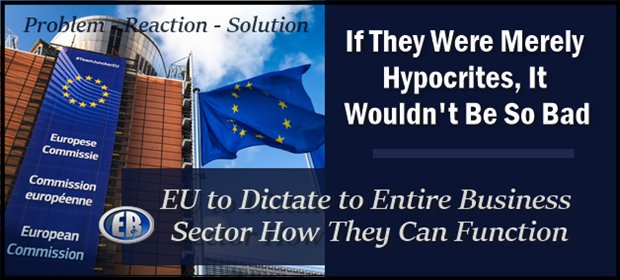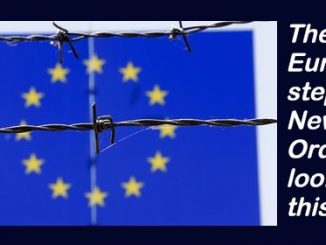
ER Editor: Notice that this article is really about a further power grab by the EU over the entire business sector. They create the mess in the first place, then create newly-minted authoritarian tools to deal with it.
********
Europe Is Buying All the Russian Oil It Can Before Banning It
IRINA SLAV for OILPRICE.COM

All Global Research articles can be read in 51 languages by activating the “Translate Website” drop down menu on the top banner of our home page (Desktop version).
To receive Global Research’s Daily Newsletter (selected articles), click here.
Follow us on Instagram and Twitter and subscribe to our Telegram Channel. Feel free to repost and share widely Global Research articles.
***
Three months from now, an EU-wide embargo on Russian crude oil imports will kick in, shutting off almost all shipments of the commodity from Russia to Europe. But right now, Europe is importing over 1 million barrels of Russian crude daily and has been doing so for the last month. Someone is stocking up before the taps turn dry.
While they publicly condemn Russia for its actions in Ukraine and equally publicly assure their constituents that sanctions are working, European (and other) politicians make no mention of the continuing Russian oil purchases.
Yet, Russia is exporting some 3.32 million barrels of crude daily by sea, Bloomberg calculations have shown, which means Europe is buying a third of that, while it still can. And this means that nothing has changed since June when the embargo was approved, and Europe will have to find alternative oil suppliers at a time of likely higher prices.
Right now, prices are slumping because of new lockdowns in China and expectations of rate hikes by central banks, but once the embargo door shuts, chances are that prices will rebound just when Europe finds it most painful. And that is exactly why it’s stocking up now on the oil it’s about to ban.
It’s not only oil that Europe is stocking up on, either. All fossil fuels are in greater and more urgent demand on the continent than they have been for years. The FT called it “the unavoidable evil of wartime fossil fuels” in a recent report and the European Union has kept repeating that the emission reduction plans are still in place although it is increasingly looking like they’ve taken the back seat to energy security.
Exports of oil from Russia to northern Europe rose particularly markedly in the first week of this month, the Bloomberg calculations showed, suggesting India’s Petroleum Minister Hardeep Singh Puri, who told CNBC this week that “I said the Europeans buy more in one afternoon than I do in a quarter. I’d be surprised if that is not the condition still.”
Puri’s comments came in response to a question about criticism leveled at India for continuing to buy crude from Russia despite Western sanctions and condemnation for the invasion of Ukraine.
The Indian top oil official took things a step further, as well. Asked about whether he had any moral qualms about importing oil from Russia, he said,
“No, there’s no conflict. I have a moral duty to my consumer. Do I as a democratically elected government want a situation where the petrol pump runs dry?”
It would be difficult to argue this point for any politician, even a European one.
One might reasonably argue that the European Union is not an authoritarian state in which the government tells commodity traders where to buy their oil from. However, one could equally argue that the bloc is trying to turn into precisely that sort of an authoritarian state.
Earlier this month, the FT reported that the European Commission had drafted a document seeking sweeping powers over European businesses. The sweeping powers, if approved, would include the “powers to require businesses to stockpile supplies and break delivery contracts in order to shore up supply chains in the event of a crisis such as the coronavirus pandemic.”
Deciding what constitutes a crisis would also be the prerogative of the European Commissionunder this draft document. Businesses have not exactly welcomed the suggestion that they could be told what to produce, stockpile, and who they trade with by the EC, so the sweeping powers are far from a certain thing. Yet, there is more than one signal the EU is moving into a more centralized-intervention style of government amid the energy crisis.
Right now, Brussels is mulling over direct intervention into energy markets because of the tidal wave of margin calls looming over an already struggling energy industry. Bloomberg reported earlier this month that the suspension of power derivatives was among the options, along with a cap on the price of gas used for power generation.
The power market has a lot more to do with the price of gas than oil, but it’s worth recalling that some European utilities switched from gas to oil for power generation when gas prices skyrocketed earlier this year. Prices have not exactly returned to normal yet, so oil continues to be a viable alternative for power generation. And in three months, imports are going to take a 1-million-bpd dive. Unless, of course, buyers find an alternative.
In all fairness, alternative sources of crude oil are abundant. Middle Eastern producers, for example, would be only too happy to sell their oil to Europe. So would Nigeria and Angola. Yet they would be setting the price. One cannot help but wonder if the European Union will start threatening OPEC with a price cap, too.
************
Source
Irina is a writer for Oilprice.com with over a decade of experience writing on the oil and gas industry.
Featured image is from OilPrice.com

••••
The Liberty Beacon Project is now expanding at a near exponential rate, and for this we are grateful and excited! But we must also be practical. For 7 years we have not asked for any donations, and have built this project with our own funds as we grew. We are now experiencing ever increasing growing pains due to the large number of websites and projects we represent. So we have just installed donation buttons on our websites and ask that you consider this when you visit them. Nothing is too small. We thank you for all your support and your considerations … (TLB)
••••
Comment Policy: As a privately owned web site, we reserve the right to remove comments that contain spam, advertising, vulgarity, threats of violence, racism, or personal/abusive attacks on other users. This also applies to trolling, the use of more than one alias, or just intentional mischief. Enforcement of this policy is at the discretion of this websites administrators. Repeat offenders may be blocked or permanently banned without prior warning.
••••
Disclaimer: TLB websites contain copyrighted material the use of which has not always been specifically authorized by the copyright owner. We are making such material available to our readers under the provisions of “fair use” in an effort to advance a better understanding of political, health, economic and social issues. The material on this site is distributed without profit to those who have expressed a prior interest in receiving it for research and educational purposes. If you wish to use copyrighted material for purposes other than “fair use” you must request permission from the copyright owner.
••••
Disclaimer: The information and opinions shared are for informational purposes only including, but not limited to, text, graphics, images and other material are not intended as medical advice or instruction. Nothing mentioned is intended to be a substitute for professional medical advice, diagnosis or treatment.




